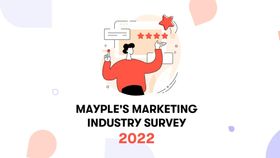Top 2025 digital marketing trends you need to know
Not sure which 2025 digital marketing trends you should pay attention to? We've asked our experts and here's what they told us.
Published January 30, 2025.

Digital marketing is a perpetually changing, ever-evolving field. With the rapid advancements in technology and shifts in consumer behavior, it is essential for businesses to stay current with their digital marketing strategies.
What are the most noteworthy digital marketing trends for 2025?
We've asked the best digital marketing agencies, and here's what we found out:
Simplified marketing mix models (MMM)
Digital marketing in 2025 will see businesses adopting more streamlined marketing mix models (even more than before).
These simplified models will focus on blending traditional methods with digital channels while emphasizing agility. Marketers will prioritize understanding their target audience directly and making data-driven decisions to achieve efficient results. This shift eliminates overly complex strategies, enabling quicker adaptations to market changes.
Automation tools will play a key role in shaping these models by handling repetitive tasks and providing insights. Companies will also experiment with smaller-scale campaigns to test effectiveness before rolling out larger initiatives. By simplifying the marketing mix, businesses can align teams better and create cohesive strategies without overcomplicating operations.
(Source)
Artificial Intelligence tools as assistants
Artificial Intelligence (AI) will become even more ingrained as a vital marketing tool by 2025. AI-driven assistants will manage critical tasks like analyzing consumer behavior, predicting trends, and crafting targeted content effortlessly. Marketers will use AI not just for efficiency but to uncover valuable insights about their audience.
Additionally, chatbots and virtual assistants will evolve to improve customer interactions. These tools will offer hyper-personalized experiences with fast responses, building trust and satisfaction. AI will also be indispensable for dynamic pricing strategies, allowing businesses to adjust pricing instantly based on demand or competitor actions.
Employee-generated content
Employees will emerge as key players in content creation through employee-generated content (EGC). By empowering team members to share authentic, behind-the-scenes stories, brands will create genuine connections with their audience. EGC not only showcases company culture but fosters trust among consumers, making businesses more relatable.
Platforms like LinkedIn and Instagram will be hotspots for employee-driven initiatives. Companies will encourage staff to highlight achievements, participate in challenges, or share day-in-the-life posts. This trend will also make employee advocacy programs stronger, as content directly from employees is seen as more credible than corporate promotions.
More focus on user-generated content
User-generated content (UGC) will dominate digital marketing strategies in 2025, offering a cost-effective way to build trust and foster community. Consumers will increasingly look to peers rather than brands for product recommendations, giving UGC a powerful influence on purchasing decisions.
Social media platforms will become the primary stage for featuring UGC, from reviews and testimonials to user-shared photos and videos. Companies will create more interactive campaigns asking customers to participate in challenges or competitions. By amplifying voices of existing customers, brands will enhance authenticity while saving time and resources.
Voice search and voice commerce
Voice assistant technology will transform how users interact with businesses. Voice search will continue growing in prominence, with consumers using devices like smart speakers or phones to look up products and services hands-free. Marketers will focus on optimizing content to suit conversational queries rather than traditional keywords.
Voice commerce will emerge as a dynamic way to convert searches into purchasing actions. Consumers will seamlessly make purchases through voice commands, making it essential for brands to optimize product catalogs for voice platforms. Businesses that adapt to this shift will enjoy higher customer convenience and engagement.
Shoppable videos popularity
Shoppable videos will redefine how brands present their products by making content instantly actionable. These videos will allow viewers to click on items showcased and make purchases without leaving the platform. Platforms like Instagram, TikTok, and YouTube will further enhance this trend with integrated shopping features.
Marketers will creatively integrate storytelling with product promotion, ensuring an engaging and effortless buying experience. Tutorials, fashion lookbooks, and product demos will dominate shoppable video formats. This trend lowers barriers between inspiration and action, boosting conversion rates significantly.
In-app AI usage
Artificial Intelligence embedded within applications will provide businesses with innovative ways to improve customer satisfaction. From personalized content recommendations to analyzing consumer behavior in real-time, AI's in-app presence will grow indispensable.
Social media platforms and brand-specific apps will integrate AI-powered features like AR filters, smart notifications, and advanced decision-making tools. Companies using AI to deepen connections with consumers will stand out, especially with fast, tailored solutions that enhance user experience. This focus on convenience and personalization ensures better loyalty and engagement.
Mindfulness and ethics
The growing demand for transparency and social responsibility will lead marketers to focus on mindfulness and ethical practices. Consumers in 2025 will prefer brands that align with their personal values, including sustainability and inclusivity. Marketing campaigns will emphasize building deeper connections rather than promoting superficial messaging.
Additionally, ethical data collection will be central to marketing strategies. Companies will prioritize user privacy and gain trust by adopting fair, open practices. Actions like supporting community initiatives, reducing environmental impacts, and fostering inclusive messaging will define impactful campaigns in the coming years.
(Source)
New social media players
The social media ecosystem will see the rise of new platforms and niche communities in 2025. These emerging networks will cater to specific interests or provide creative alternatives to established giants like Facebook or Instagram. Companies will seek opportunities in these spaces to connect authentically with untapped audiences.
Some digital marketing specialists say the great battle will play between X, Threads, and BlueSky -- and while you may not want to jump on every social media channel out there (spoiler alert, there's quite a lot of them), staying on top of the latest news will help you choose the ones that are most likely to be appreciated by your audience.
Marketers will explore experimenting with micro-influencers on these platforms to drive engagement. By being early adopters, brands can position themselves as trendsetters while adapting their tone to fit the platform culture. Staying flexible will allow businesses to thrive across both mainstream giants and emerging players alike.
Generative engine optimization
With advanced AI capabilities on the rise, generative engine optimization (GEO) will revolutionize digital marketing. Businesses will rely on AI tools like ChatGPT to craft high-quality content tailored to search engine algorithms. This trend will enhance SEO with faster and scalable creation of blog posts, email campaigns, and product descriptions.
Generative models will complement creativity rather than replace it, especially for generating ideas and structuring content. Companies leveraging GEO effectively will maintain a steady flow of optimized output to dominate organic search and meet evolving user expectations.
AR and VR on the rise
Augmented Reality (AR) and Virtual Reality (VR) will cement themselves as game-changers for immersive marketing experiences. From virtual product try-ons to fully interactive VR shops, these technologies will redefine customer engagement. Brands in fashion, automotive, and real estate will particularly thrive with this trend.
High-quality AR and VR campaigns will bring products directly into users' lives, eliminating uncertainties that traditional methods couldn't address. Increased accessibility of devices will accelerate the adoption rate, marking AR and VR as integral tools for exciting innovations in visual storytelling.
More video content
Video content will continue to dominate among all marketing formats thanks to its ability to capture attention quickly. Platforms like TikTok, YouTube Shorts, and Reels will see explosive growth. Brands will employ short, engaging clips to share key messages or entertain their audience.
Longer video formats like webinars or virtual events will also retain importance in conveying expertise and building trustworthiness. Companies will experiment with diverse video styles, from explainer animations to live streaming.
Scaled personalization
2025 will bring scaled personalization to the forefront, with marketing efforts tailored to individual preferences at an unprecedented level. Advanced AI and data analytics will allow businesses to deliver messages fine-tuned to each customer’s behavior, location, and needs.
From curated product recommendations to personalized email campaigns, businesses will focus on creating one-to-one connection experiences. This level of personalization will foster loyalty, boost engagement, and enhance the overall user experience. Successful companies will integrate customer data responsibly while meeting privacy regulations.
A change in skillsets
With the rapid evolution of digital marketing technologies, marketers will need to adapt by acquiring new skills. Understanding AI tools, AR/VR content creation, and data analytics will become necessities for professionals in the field. Companies will invest in upskilling their workforce to keep pace with the fast-paced changes.
Creativity, strategic thinking, and adaptability will remain crucial, but marketers must expand their technical capabilities to stay competitive. Cross-functional collaboration between marketing, technology, and design teams will also see increased importance as companies strive to produce innovative campaigns.
Conclusion
It's never boring in digital marketing -- au contraire. But 2025 is bound to be a fork in the road for the industry. By keeping a finger on the pulse of emerging trends and adapting to new technologies, businesses can remain at the forefront of their game while creating meaningful connections with their audience.
It's an exciting time for digital marketing, and the possibilities are endless. So buckle up and get ready for an exhilarating ride into the future of marketing! And if you need help, contact Mayple and we'll connect you with the best digital marketing agencies for your industry and location.






